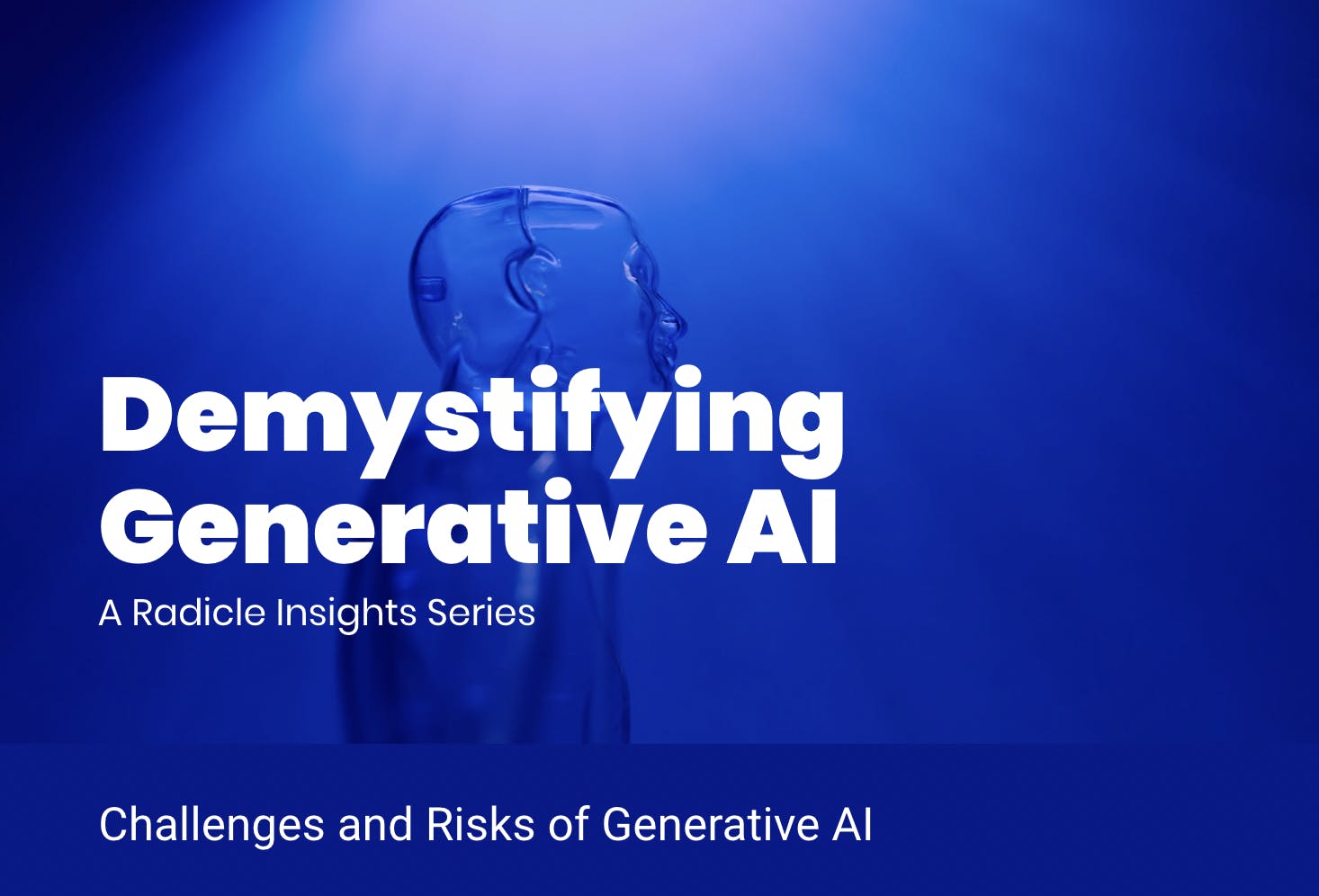
Welcome back to our ongoing blog series, "Demystifying Generative AI." Today, we're addressing a key topic that's on the mind of every leader considering the adoption of this powerful technology: the challenges and risks associated with implementing Generative AI. By understanding these potential pitfalls, businesses can take proactive steps to mitigate them, ensuring a smooth and effective integration of Generative AI.
Check out the first four installments here:
- The Basics and Business Implications of Generative AI
- Generative AI in Practice: How are businesses currently using generative AI?
- Implementing Generative AI: What resources (both human and technical) are needed to implement generative AI and what are the key steps in the implementation process?
- The Business Case for Generative AI
Challenge 1: Data Privacy and Security
Generative AI relies heavily on data. The richer and more varied the dataset, the better the AI can learn and generate high-quality outputs. However, handling this much data raises significant privacy and security concerns. For example, a recent bug in OpenAI’s ChatGPT product allowed users to see search titles and messages of fellow users, prompting companies like Apple, Amazon, Northrop Grumman, and Verizon to prohibit its use for internal purposes. Businesses need to ensure they are adhering to all relevant data protection laws and ethical guidelines, and that they are taking robust measures to prevent data breaches.
Mitigation: Implement strong data governance policies and practices, including data anonymization techniques and strong encryption methods. Also, stay abreast of evolving data protection laws and regulations to ensure compliance.
Challenge 2: Bias and Fairness
Generative AI learns from the data it's fed. If the data is biased, the outputs can also be biased. This can lead to unfair or discriminatory results that can harm certain segments of your audience and damage your brand's reputation.
Mitigation: Strive to use unbiased and representative datasets when training your AI models. Regularly test and monitor your AI's outputs for any signs of bias or discrimination. Incorporate ethical considerations into your AI strategy from the outset.
Challenge 3: Explainability and Transparency
Generative AI models, especially those based on deep learning, are often referred to as "black boxes" because their decision-making processes are not easily understood. This lack of transparency can be a barrier to trust and acceptance, both within your organization and among your customers.
Mitigation: Work on improving the explainability of your AI models. This can be achieved through techniques like model interpretability and local interpretable model-agnostic explanations (LIME). Alternatively, one can partner with a model-provider such as Anthropic who prioritize transparency. Regularly communicate with your teams and customers about how your AI works and the steps you're taking to ensure its fairness and reliability.
Challenge 4: Integration and Change Management
Integrating generative AI into existing business processes can be a complex task. It requires technical know-how and often necessitates changes in workflows and job roles. This can lead to resistance among your employees.
Mitigation: Successful AI integration requires a well-planned change management strategy. Involve your employees in the process from the beginning, offer necessary training, and address their concerns and fears. Emphasize the value AI can add, not just to the business, but to their individual roles.
Challenge 5: Ethical Considerations
Finally, as generative AI can create entirely new content, it can potentially be used for malicious purposes, such as spreading fake news or creating deepfakes. Additionally, many popular foundational models are trained on copyrighted data from human creators, with fair compensation and attribution a point of contention between model providers and copyright holders. Finally, as AI takes on more tasks previously done by humans, it raises important ethical questions about job displacement.
Mitigation: Businesses should develop and adhere to a strong ethical framework for the use of AI. This includes having clear policies about acceptable uses of generative AI and strategies to support employees whose roles may be affected.
Remember, the goal is not to shy away from Generative AI because of these challenges, but to confront and mitigate them head-on. In our next edition, we will be exploring the "Future of Generative AI," to help you stay ahead of the curve as this transformative technology continues to evolve. Stay tuned!
If you’re interested in and intrigued by Generative AI and Radicle’s expert-led approach, we’d love to share some insights over a 15-20 minute chat, which you can schedule some time here.